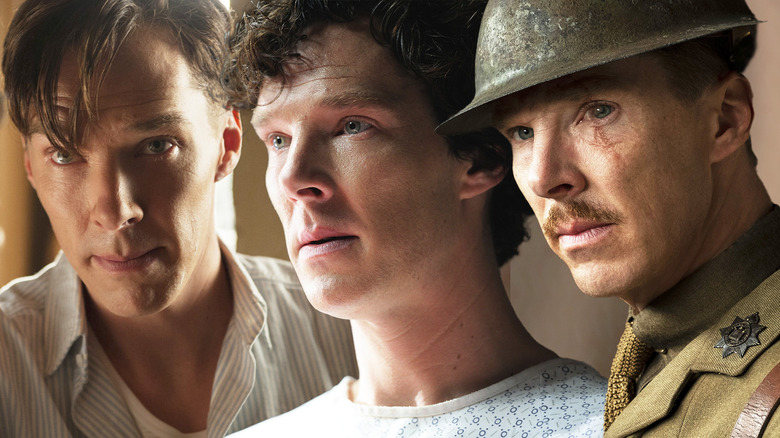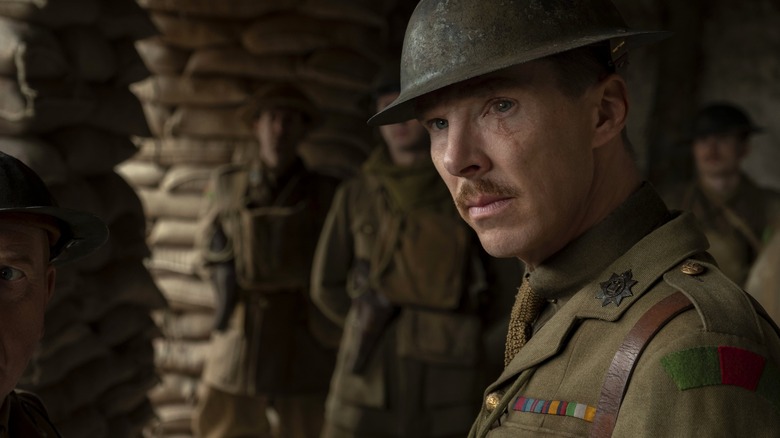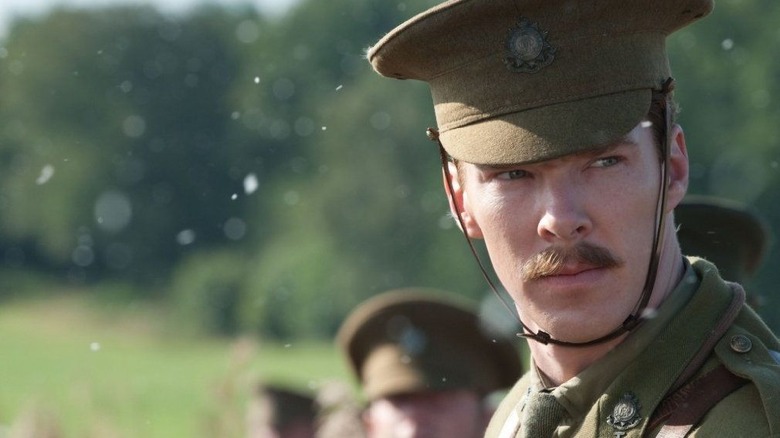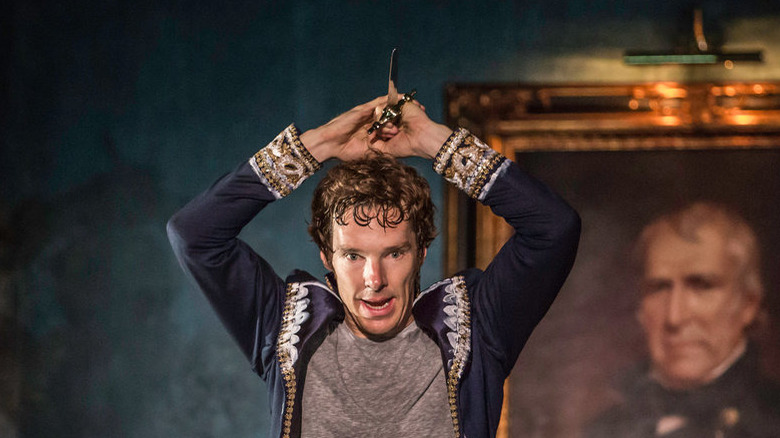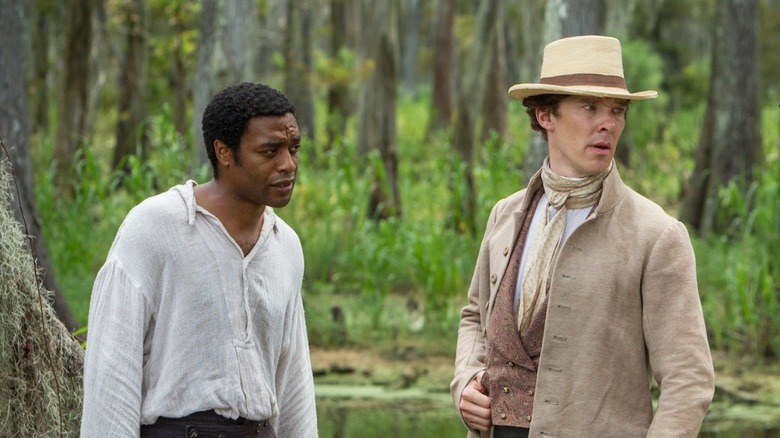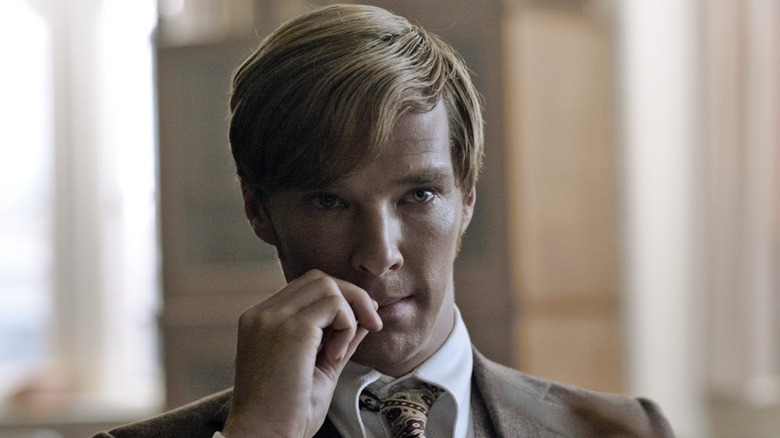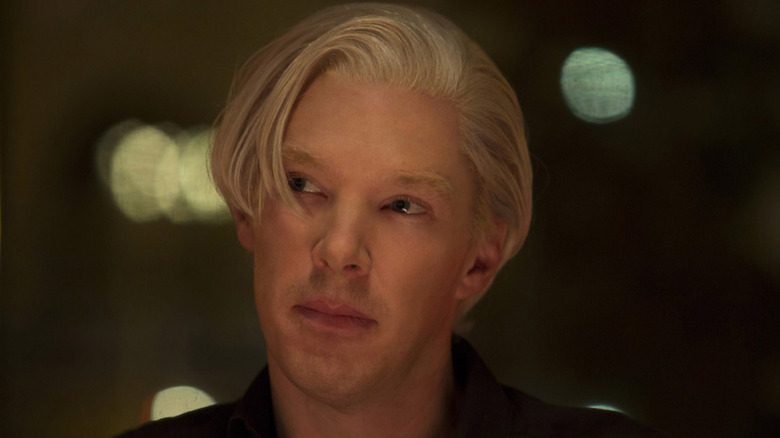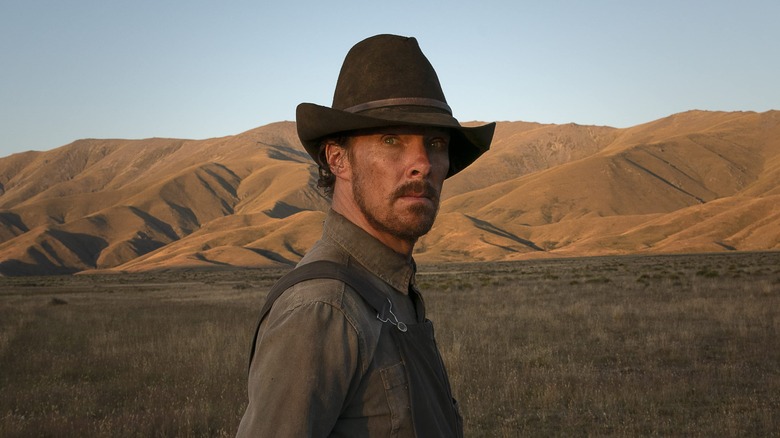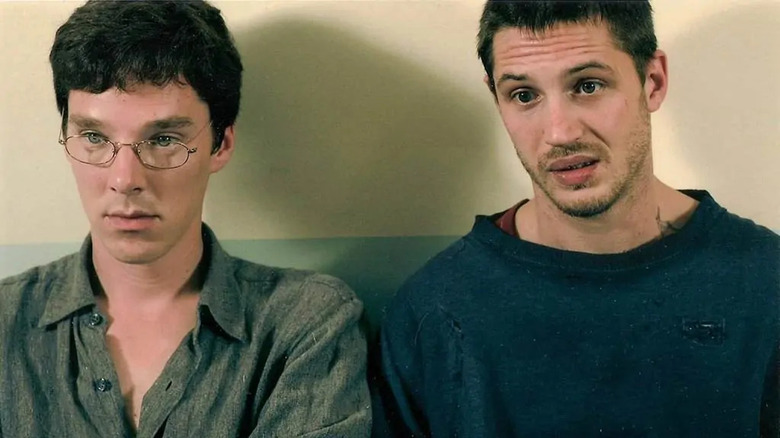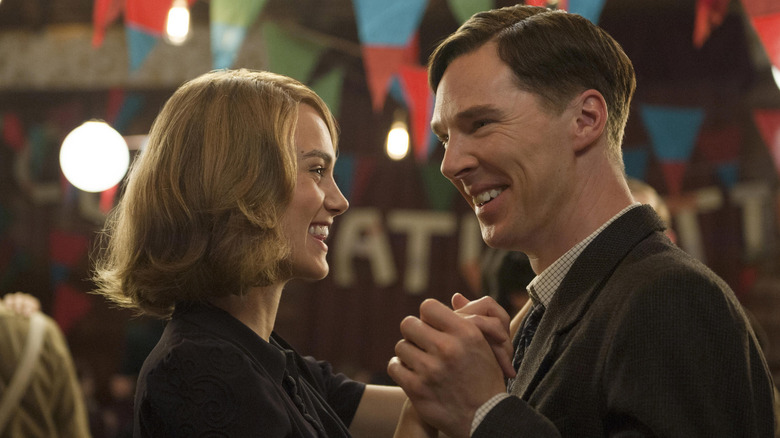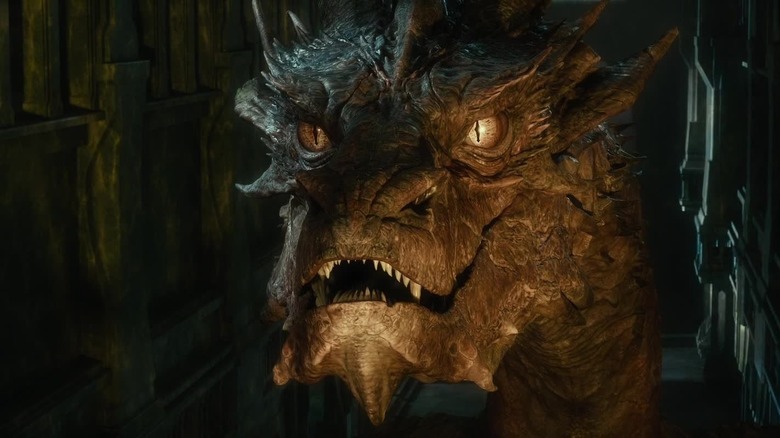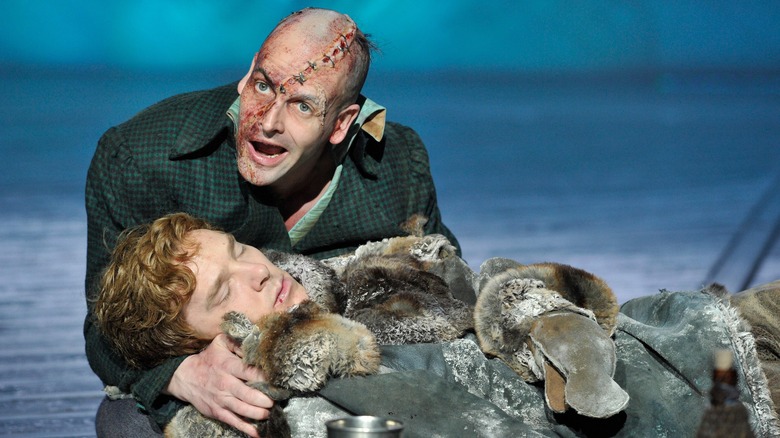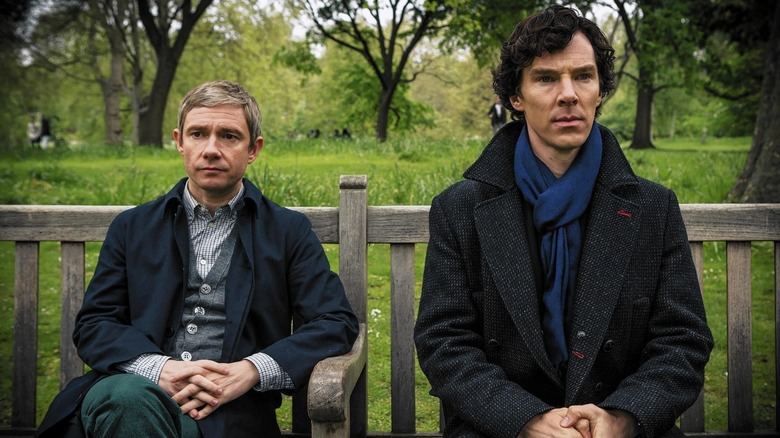The 12 Best Benedict Cumberbatch Roles That Aren't Doctor Strange
Today he may be best known for setting up the multiverse threads of the MCU, but before (and after) taking on the role of Dr. Stephen Strange, British actor Benedict Cumberbatch put together an impressive resume of performances, ranging from the stage to television to the silver screen. After graduating from the University of Manchester's Drama program and earning a master's from the London Academy of Music and Dramatic Arts in 2000, Cumberbatch found steady work in the U.K., eventually answering Steven Spielberg's call in 2011's "War Horse."
Since then, he's been a mainstay in Hollywood, with an ardent fan base ready to fight for him online and show up to (most) of his films. Throughout his 20-plus years as a working actor, Cumberbatch has had his share of missteps (I'm looking at you, "Star Trek Into Darkness"), but for the most part, his movie choices have typically been sound and his performances solid, even on the rare occasion when the material fails him. Without further ado, and Doctor Strange aside, here are Benedict Cumberbatch's 12 best roles across film, television, and theatre.
Lieutenant-Colonel Mackenzie, 1917
While effectively amounting to a cameo, Benedict Cumberbatch's role as Col. Mackenzie in Sam Mendes' WWI drama "1917" edges its way onto this list due to the character's importance throughout the film. "1917", known for its long-take aesthetic, follows two lance corporals, Will Schofield (George MacKay) and Tom Blake (Dean-Charles Chapman), tasked with delivering a message across the Western Front to the colonel to prevent the British Army from falling into a trap set by the Germans.
With Cumberbatch's Mackenzie as the end goal of their journey, we watch the two young soldiers face tremendous danger and overcome (and succumb to) numerous challenges. There's a sense of relief Schofield finally reaches Mackenzie, and when he turns around to face the camera, Cumberbatch's reveal feels like an applause break. And not just because he's a familiar face but because the excruciating mission we've found ourselves on is at last complete.
Major Jamie Stewart, War Horse
An old-fashioned Spielbergian film, "War Horse" tells the story of Joey, a bay Irish Hunter who develops a close friendship with the son of an English farmer. As WWI breaks out across Europe, Joey is sold to the British Army and deployed to Flanders under Capt. James Nicholls and Maj. Jamie Stewart, who lead the cavalry through a German encampment.
In his first major Hollywood picture, Benedict Cumberbatch plays the small but important role of steely Maj. Stewart, alongside Tom Hiddelston's Capt. Nicholls and Patrick Kennedy's Lt. Charlie Waverly. Collectively, the three soldiers show the varying attitudes of young men sent to war. While Waverly is the subservient soldier who falls in line, and Nicholls has the most realistic understanding of war, Stewart represents the prototypical soldier. As a tough disciplinarian whose fears are deeply suppressed, Cumberbatch gives a glimpse into his abilities to tackle multi-faceted characters in this early role.
Prince Hamlet, Hamlet
As of writing, 2015's "Hamlet" at London's Barbican Theatre was Benedict Cumberbatch's last stage performance. Like most British actors, Cumberbatch began his career in the theatre, and at the ripe age of 39, it was high time he tackled one of the Bard's most storied characters and plays.
Unfortunately for Cumberbatch, Lyndsey Turner's adaptation of "Hamlet" became an exercise in trying too hard to create a unique vision of one of the most well-known and frequently produced stories. Altering the structure and introducing kitschy elements, Turner's "Hamlet" left much to be desired. However, the brightest spot was Cumberbatch (naturally). Unsurprisingly, his delivery of the legendary "To be or not to be" soliloquy brought the house down, and his stoicism lent gravity to Hamlet's final moments, emphasizing the weight of the events we watched unfold. While his performance deserved a much better show around him, Cumberbatch's Prince Hamlet remains a solid outing by the actor.
William Ford, 12 Years a Slave
Given the recent news of Benedict Cumberbatch's ancestral ties to slavery, his role as William Ford, a benevolent slave owner (the greatest oxymoron to ever exist), is steeped in irony the actor would likely rather not exist. "12 Years a Slave" is the story of Solomon Northup (played with a tremendous amount of depth and heart by Chiwetel Ejiofor), a free man who was kidnapped and sold into slavery. Cumberbatch's Ford, the Baptist preacher who buys Solomon, is described in the latter's memoirs as kind and noble, despite the nature of their relationship.
The role of Ford in a film like "12 Years a Slave" is tricky. The idea of showing a slave owner as anything other than a villain is inconceivable. Yet, through Steve McQueen's direction, John Ridley's script, and Cumberbatch's performance, Ford becomes a compelling character. Cumberbatch offers a carefully sympathetic portrayal, almost befriending Solomon. In contrast to Solomon's next owner, Edwin Epps (Michael Fassbender), Ford seems generous. All of this, though, is belied by Ford's very appearance in the film: He's a man who buys humans when they're convenient and sells them when they're not.
Peter Guillam, Tinker Tailor Soldier Spy
A classic of the spy genre and a staple in John le Carré's storied bibliography, "Tinker Tailor Soldier Spy" is an espionage tale set during the height of the Cold War that has been adapted multiple times, including into a 2011 film by Tomas Alfredson. Benedict Cumberbatch plays Peter Guillam, a recurring character in le Carré novels and right-hand man to George Smiley (Gary Oldman), a lead character in many of the author's books.
Cumberbatch's turn as Guillam is decidedly vulnerable. When we first meet Guillam, he is a staunch follower of Smiley and slightly naive concerning his job as an intelligence officer. Throughout "Tinker Tailor Soldier Spy," we come to understand the human cost associated with this line of work. In a heartbreaking scene in which Guillam breaks up with his boyfriend to protect him from harm, Cumberbatch brings to light the loneliness and personal sacrifice through loud emotional moments as well as quiet subtle nods across the film.
Julian Assange, The Fifth Estate
Benedict Cumberbatch has a reputation for many things among his fans, his abilities as an impressionist primary among them. And while he entertains on programs like "The Graham Norton Show" with his Alan Rickman, Michael Caine, and Chewbacca impressions, his ability to take on real-life individuals with pronounced and distinguishable quirks without becoming a mimic is truly impressive. Throughout his career, Cumberbatch has employed this talent when portraying real-life figures, but perhaps none posed more of a challenge than portraying Julian Assange in Bill Condon's "The Fifth Estate."
When the film was released, WikiLeaks and its founder Julian Assange were heavily featured in the news cycle and satirized by comedians and sketch shows. Although "The Fifth Estate" didn't end up being the topical, dramatic thriller it had hoped, Cumberbatch succeeds in creating a well-rounded portrait of a much-maligned public figure. Cumberbatch finds the humanity in Assange that tabloids and other news outlets chose to ignore.
Phil Burbank, The Power of the Dog
Jane Campion's "The Power of the Dog" is a tour de force of filmmaking that explores masculinity, societal pressures, and familial bonds. Her deft direction and storytelling make poignant observations that transcend time and space, while her ensemble offers strong performances.
As the unrefined and quick-tempered Phil Burbank, Benedict Cumberbatch leads the film with Jesse Plemons, who plays George, Phil's kind-hearted brother. Surly and cruel, Phil is the textbook overcompensating cowboy, especially unkind to Peter (Kodi Smit-McPhee), the son of Rose (Kirsten Dunst), George's love interest. The reason for Phil's malice and general hostile disposition is revealed in pieces through Cumberbatch's nuanced performance.
In many ways, "The Power of the Dog" is a classic Western, but the characterizations seem very modern, allowing for a complexity not traditionally offered to the staunch alphas of the Wild West. With Cumberbatch's stirring performance at the film's fore, it's no wonder the movie and his performance have been so heavily lauded and awarded.
Alexander Masters, Stuart: A Life Backwards
"Stuart: A Life Backwards" is the television adaptation of Stuart Clive Shorter's biography written by his best friend Alexander Masters (Benedict Cumberbatch). Shorter (played in the film by Tom Hardy) led a difficult life, suffering sexual abuse as a child, having mental health issues, and being homeless at multiple points in his life. In adulthood, he became an activist, and his advocacy would bring to light many of the issues facing unhoused people in the U.K.
Naturally, the meatier and showier role of the two leads belongs to Hardy (who is fantastic), but Cumberbatch's Masters, acting as a conduit for the audience, anchors the film against the intensity of Shorter. Beginning as a jaded and indifferent charity worker, Masters develops a friendship with Shorter that instills sympathy and compassion where there initially was none. Cumberbatch and Hardy work exceptionally well together, with Cumberbatch taking the quieter approach. It's a subtle role that is arresting in all the right ways.
Alan Turing, The Imitation Game
Alan Turing's contributions to technology (and, in turn, society, culture, and politics) cannot be overstated. His work is the basis for the modern-day computer and artificial intelligence. As a codebreaker for the British government during World War II, he cracked the Enigma machine, a complex Nazi device for generating coded messages. The latter is the focus of "The Imitation Game," as well as the appalling treatment of Turing by the British government due to his sexual orientation.
Cumberbatch's universally applauded performance was nominated for every major acting award of 2015, garnering the actor his first Academy Award nomination. The emotional beats Cumberbatch hits across the film are affecting and earned, but it's his ability to melt into Turing's physicality that impresses the most. Cumberbatch actualizes Turing's known eccentricities and physical ticks without becoming a caricature, instead using them to drive the narrative and create a complete picture of the complex man. In years to come, "The Imitation Game" will stand as one of the crown jewels of Cumberbatch's career, and deservedly so.
Smaug, The Hobbit Trilogy
The behind-the-scenes footage of Benedict Cumberbatch's motion-capture performance as Smaug is what initially grabbed my attention and made me want to watch "The Hobbit." Filmed entirely on a sound stage, Cumberbatch, in grey pajamas, a scattering of dots on his face, crawls and leaps around with abandon. Smaug's strength and vanity are apparent in each of Cumberbatch's neck contortions, eye narrowings, and sizzling hisses.
Typically, dragons, as portrayed in film and television, are feared for their gargantuan size and firey breath. However, what makes Smaug unique in J.R.R. Tolkien's literary world is the deliciously devious personality he gave the wicked creature, which Cumberbatch superbly brings to life. He doesn't just act out Smaug; He embodies the smug dragon in every sense of the word. While Cumberbatch's performance alone couldn't save the trilogy, it remains an incredible piece of work and one of his more unique roles.
Victor Frankenstein/The Creature, Frankenstein
I saw Benedict Cumberbatch and Jonny Lee Miller's 2011 production of "Frankenstein" via the Royal National Theatre's "NT at Home" series in April 2020. I was blown away. The story of "Frankenstein" is well-known and has captivated audiences for centuries with its themes of obsession, grief, and power.
In a departure from tradition, Nick Dear's adaptation of the tale of the monster and doctor is told from the Creature's point of view rather than Victor Frankenstein's. Cumberbatch and Miller alternated between the two main roles every night, providing a creative spin on the stage production and giving audiences a reason to go more than once. Both men were incredible in the roles (they shared the 2012 Laurence Olivier Award for best actor), bringing an animalistic quality to the Creature that felt raw and visceral while lending an insidious narcissism to Victor. Similar to his turn as Smaug, Cumberbatch's acting continues to impress beyond impressions, accents, and facial ticks. He uses physicality in a way few of his peers can.
Sherlock Holmes, Sherlock
Of course, we had to include "Sherlock" on this list. It's the role that made Benedict Cumberbatch an international superstar and earned him legions of fans. He's bloody brilliant as Sherlock Holmes.
"Sherlock" brings Sir Arthur Conan Doyle's consulting detective into the modern era by letting him loose in the streets of London with smartphones and GPS apps in tow. Cumberbatch's Sherlock continues the tradition of the great master of deduction by being too logical for his own good. With the help of Martin Freeman's John Watson, we see the stark contrast between polite society and Sherlock's cold demeanor. Cumberbatch imbues a sense of 21st-century bumbling quirkiness into his Sherlock that is balanced with an old-world charm and formality. Although many actors have played Sherlock Holmes on the radio, stage, television, and film, Cumberbatch made the British detective entirely his own. We can only hope that one day Cumberbatch again dons the tweed overcoat and floppy hair because the game is always afoot.
